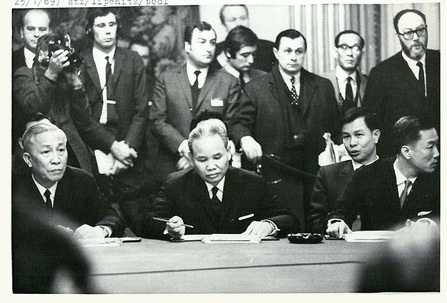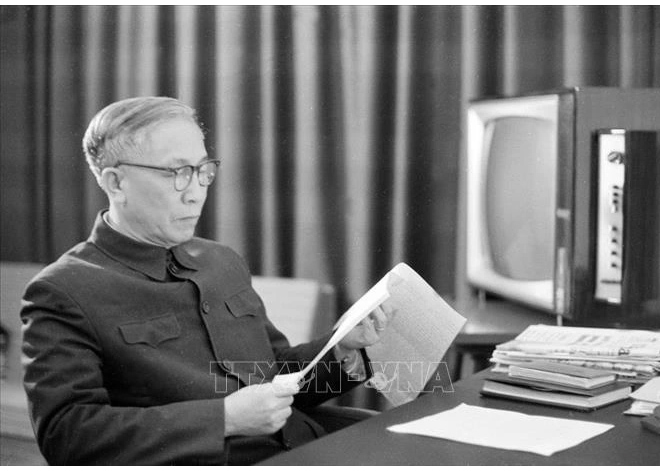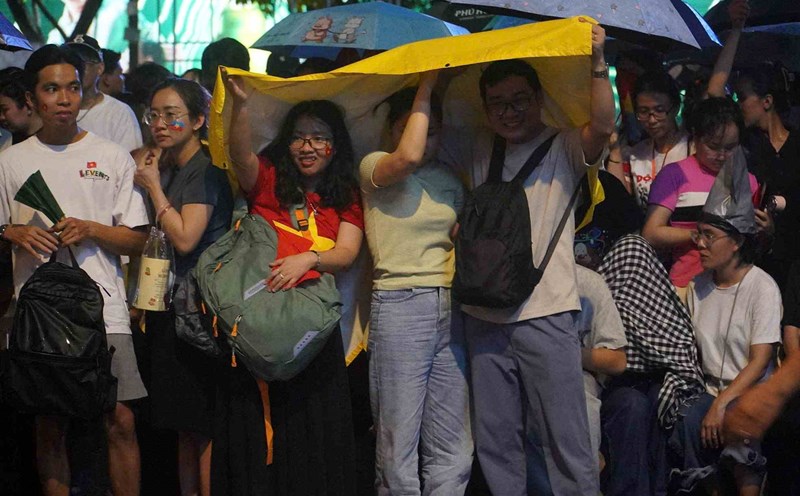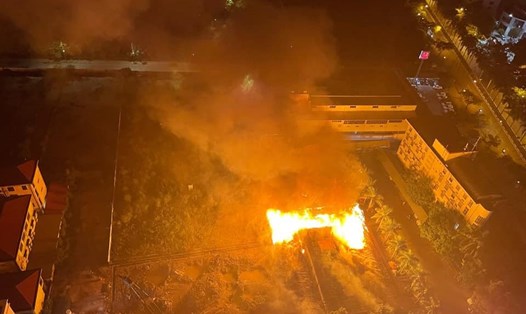Mr. Le Duc Tho - former Politburo member, Head of the Central Organizing Committee, has many years of experience on the battlefield from the resistance war against France to the US, he has held many important positions in the Party.
In 1968, while he was Deputy Secretary of the Central Committee of the Southern Department, Mr. Le Duc Tho was urgently called back to Hanoi by President Ho Chi Minh to take up the task of "Special Advisor" in the diplomatic delegation of the Socialist Republic of Vietnam to Paris to negotiate peace and end the war in Vietnam.
Outstanding diplomatic personnel of the Vietnamese revolution
The negotiations for signing the Paris Agreement lasted for more than 4 years between 4 parties: The delegation of the Government of the Democratic Republic of Vietnam was headed by Mr. Xuan Thuy, Mr. Le Duc Tho was an advisor, the delegation of the National Liberation Front of South Vietnam (originally led by comrade Tran Buu Kiem, later Ms. Nguyen Thi Binh replaced), the other side was the American delegation and the Saigon government.
The longest negotiation in history is a true front, where the brainwashing between the parties, between the United States and the National Front Liberation of South Vietnam, between the United States and the Democratic Republic of Vietnam delegation. In the fierce battlefield, the diplomatic front was so tense.
According to statistics, the negotiations from 1968 to 1972 had 201 public meetings, 45 high-level private meetings, 24 secret meetings, 500 press conferences, 1,000 interviews...
In particular, the private meetings between Special Advisor Le Duc Tho and National Security Advisor - US Secretary of State at that time, Henry Kissinger, were considered historic brain-wasting when the battlefield in Vietnam was in a fierce conflict.
Documents from the National Archives Center II recorded that in the 3 years of 1970 1972, the two men Le Duc Tho and Henry Kissinger went through dozens of negotiation sessions.
Kissinger once said about Mr. Le Duc Tho: "He is a worthy opponent", " need to negotiate with Mr. Le Duc Tho is a brain game".

According to documents recorded from the National Museum of History, Mr. Le Duc Tho was chosen to go to Paris because he was experienced in battlefield, suitable for implementing the strategy of "both fighting and negotiating".
The fighting situation is constantly changing, the battlefield is tense, but in every private or general meeting, Mr. Le Duc Tho always follows the motto, "Facing constantly, constantly changing". The constant is that the US must withdraw troops from Vietnam, while our troops from the North will continue to stay in South Vietnam to fight until the day of unification.
In her memoir Family, friends and country, Ms. Nguyen Thi Binh described the tense confrontations between advisor Le Duc Tho and Henry Kissinger as historic dao dai.
In 1972, when the US continuously launched aggression on the battlefield, between Mr. Le Duc Tho, Foreign Minister Xuan Thuy and Henry Kissinger, there was a "fiery" controversy that lasted for more than 2 months surrounding the Draft Paris Agreement.
In December 1972, the US suddenly escalated the North's sabotage, continuously airstrikes for 12 days and nights with B52s on Hanoi and Hai Phong. But this US pressure plan failed. Our army bravely won the battle of "Dien Bien Phu in the air", forcing the US to go down the scale of war.
In the book "The negotiations Le Duc Tho and Kissinger in Paris" recounted that when the US lost the air strike, the world public opinion was indignant to respond to the US government, at this time, they were forced to resume the negotiations to sign the Paris Agreement.
The book describes, "Mr. Le Duc Tho's adviser returned to the negotiating table with the glory of Dien Bien Phu battle in the air." In the final match, Mr. Tho clearly showed his determination to the end, asking the US to withdraw troops from Vietnam, ending the war, restoring peace for Vietnam.
To achieve the historic Paris Agreement signed on January 27, 1973, Vietnam had outstanding personnel on all political, military and diplomatic fronts.
In particular, on the diplomatic front lasting more than 4 years is the mark, talent, and outstanding achievements of Mr. Le Duc Tho, Minister Xuan Thuy and former Vice President Nguyen Thi Binh.
Rejecting the Nobel Peace Prize
In October 1973, after successfully signing the Paris Agreement, Mr. Le Duc Tho became the first Asian to be awarded the Nobel Peace Prize, along with Henry Kissinger. However, Mr. Le Duc Tho refused.

The New York Times reported that Mr. Tho refused to accept the Nobel Peace Prize with the reason, " peace has not really been restored in my country".
In the book Le Duc Tho and Kissingers negotiations in Paris, Mr. Le Duc Tho later sent a letter to the Nobel Prize Committee, in which he wrote clearly how the US has carried out the war of aggression in Vietnam, so the Nobel Committees stance of wagressors (US) and invaders (Vietnamese people) is something that he cannot accept, so he did not accept the award.
There are many reasons given, but later, answering the press, Mr. Le Duc Tho's son said that his father would never accept the award for him personally. Mr. Le Duc Tho said that he served the nation, the Nobel Peace Prize should only be awarded to the Vietnamese people - those who have fought and contributed to peace.
The 1973 Nobel Peace Prize is still the most controversial Nobel Prize, having received backlash from the press and public opinion, even "slander" when it was awarded to Henry Kissinger. The New York Times called the award Nobel of War.
Many newspapers reported that after receiving the Nobel Peace Prize in absentia, Henry Kissinger tried to return it but was rejected by the Nobel Committee.











